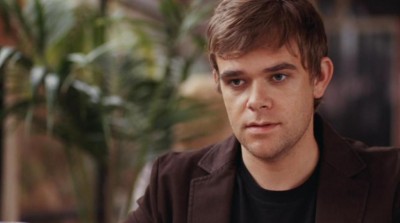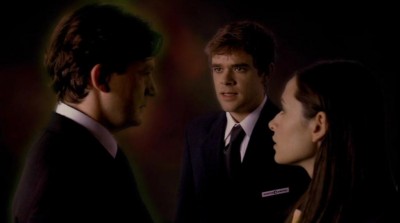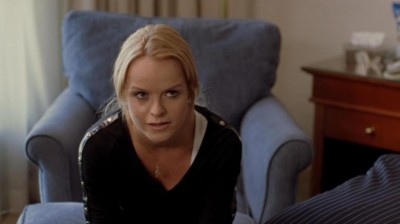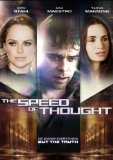| Reviews & Columns |
|
Reviews DVD TV on DVD Blu-ray 4K UHD International DVDs In Theaters Reviews by Studio Video Games Features Collector Series DVDs Easter Egg Database Interviews DVD Talk Radio Feature Articles Columns Anime Talk DVD Savant Horror DVDs The M.O.D. Squad Art House HD Talk Silent DVD
|
DVD Talk Forum |
|
|
| Resources |
|
DVD Price Search Customer Service #'s RCE Info Links |
|
Columns
|
|
|
Speed of Thought, The

THE FILM
Imagine "Inception." Now imagine "Inception" with a C-list cast, obscure locations, and a visual effects effort similar to a PBS production from the 1980s. "The Speed of Thought" is yet another indie film too ambitious for its own good, constructing a psychological thriller without a proper budget, rendering the feature awkward and downright silly at times, despite an intriguing concept.
John Lazarus (Nick Stahl) is a telepath employed by the government (led by Blair Brown) to infiltrate the minds of enemies, probing their every thought and stealing their secrets. While healthy, John is prepared to face madness via a disease that debilitates the gifted, held off temporarily through a routine of pills delivered by his friend, Sandy (Wallace Shawn). Working on a case, John comes across Anna (Mia Maestro), an untrained telepath who startles the investigator with her raw gifts. Sparking an immediate attraction, the two share their lives through their minds, with Anna revealing a crucial secret that radically changes John's worldview. Now armed with awareness, John looks to elude his protectors, using help from his trusted associate, Kira (Taryn Manning).

Writer/director Evan Oppenheimer has a compelling idea for "The Speed of Thought," but lacks the tools and no-budget imagination to triumphantly execute his plans. It's a bizarre screenplay that merges mental gymnastics with whispered romantic monologuing, placing two unlikely lovers in the middle of a silent war, with the mind acting as a battlefield. Civilians are "Normals," people blissfully unaware they've left their internal kitchen window open for anyone to slip through. "Scoping" is the act of mental invasion, which the telepaths both engage in and resist against. More rules and terms litter the writing, suggesting a grand opera of sci-fi paranoia and devastation unfurling within an epic widescreen space, following John as he discovers the actual limits of his powers.
Sadly, "Speed of Thought" doesn't play out that heroically, instead keeping to a dull roar as John and Anna get to know each other inside their private cranial realm. Oppenheimer spends the opening of the film hinting toward suspense, while the rest of the picture sticks with googly eyes between two lackluster personalities trapped in a low-tech greenscreen environment. I feel somewhat bad for Stahl and Maestro, forced to conjure emotion on a bare stage, hesitantly maneuvering around the frame while Oppenheimer fills in the necessary sets and props in post-production. It's a dreamscape artificiality the feature doesn't shake, crippling the performances, constantly drawing eyes to the budget production value and not the sensitivity the filmmaker is hoping to express. The screenplay doesn't help much either, with elongated speeches of bad poetry passing for heartfelt communication. There's a warm core here somewhere, but nothing comes alive, with too much attention placed on shoddy technology and not on the ideal shaping of a relationship that, allegedly, holds some type of profundity.

THE DVD
Visual:
The anamorphic widescreen (1.78:1 aspect ratio) presentation struggles to bring out the vibrancy of the greenscreen images, with primary colors looking restrained and fuzzy, showing more consistency in the real-world scenes. Skintones are accurate, while black levels are iffy, clotting during low-light sequences. Overall clarity is generally more confident in the daylight, permitting an ideal view of locations and actors.
Audio:
The 5.1 Dolby Digital sound mix is moderately convincing during the brain visits, offering an otherworldly hum of sorts to articulate the change in surroundings. Dialogue encounters a few moments where scoring and atmospherics step on the finer points, losing some of the conversation along the way. There's not much density here, even when the action heats up. It's a thin mix, but serviceable. A 2.0 track is also available.
Subtitles:
No subtitles have been included.

Extras:
"Behind the Scenes" (3:00) is more B-roll footage, observing a few brief moments on the set as Oppenheimer arranges his shots and commands his troops.
"Bloopers" (5:02) are an odd inclusion on this disc, considering how humorless the movie is. It's a typical run of mix-em-ups, showcasing blown lines and giggle fits of the cast.
"Deleted and Extended Scenes" (9:02) restore some needed character business, reinforcing the ominous feeling of impending death the finished film only hints at. The scenes are presented unfinished and often accompanied by overbearing temp track selections.
A Trailer has not been included.

FINAL THOUGHTS
"The Speed of Thought" is such an inert production, it's difficult to buy into the fantasy it's hoping to sell to the viewer. An effort is made to liven up the feature with some last act thriller developments, but the effort is a little late, with any clear opportunity to invest in these characters long gone. Ambition is wonderful, and I applaud Oppenheimer's initial creativity. However, the finished film doesn't carry any significant dramatic or visual significance.
|
| Popular Reviews |
| Sponsored Links |
|
|
| Sponsored Links |
|
|
| Release List | Reviews | Shop | Newsletter | Forum | DVD Giveaways | Blu-Ray | Advertise |
|
Copyright 2024 DVDTalk.com All Rights Reserved. Legal Info, Privacy Policy, Terms of Use,
Manage Preferences,
Your Privacy Choices | |||||||














